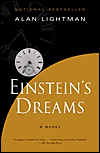“I had a frame of reference,
I set it on the fence,
Along came relativity,
ain’t seen the damn thing since.”From “Einstein the Genius,” by the Cranberry Lake Jug Band.
Today is Albert Einstein’s birthday (he would have been 127). It took just about all of the math skills I have to calculate that number so it might seem strange for me to be pointing out this occasion. I like Albert well enough, but what I really appreciate about this day is the chance to flog one of my all-time favorite books, Einstein’s Dreams.
The book, written by MIT physics and writing professor Alan Lightman, is a collection of 30 short, beautifully written vignettes (plus a couple of interludes) describing a series of imagined dreams Einstein had leading up to publishing his theory of relativity. Each dream describes a different mind-stretching world in which time operates – or is perceived – in a different manner. In one world, for example, people living at higher altitudes age more slowly than those closer to sea level; in another world all possible consequences from any decision are lived out regardless of the original decision; in a third the passing of time naturally brings order rather than chaos and degeneration. Each vignette is written in language that is both as ornate as a Swiss cuckoo clock — and every bit as functional and tightly crafted. Here’s an excerpt from the book’s prologue:
|
 |
Most of the dreams are described in no more than two or three pages, yet this isn’t a book to rip through at lunch time. I suggest reading no more than one dream per day, and taking the time not only to revel in the quality of the writing and story-telling but to imagine yourself in each world as it’s described and to picture the effect that that version of time would have on your life.
In addition to the enjoyment and inspiration I’ve received from reading this book (and re-reading sections at random from time to time), it was also the basis of a very interesting creative writing program I put my oldest daughter through as part of her home-education. Finally, while the book is not “Christian” or obviously spiritual, it did help me get a deeper understanding of how God inhabits my past, present and future. Make time to read this book and I can guarantee that you won’t ever look at time the same way again.











